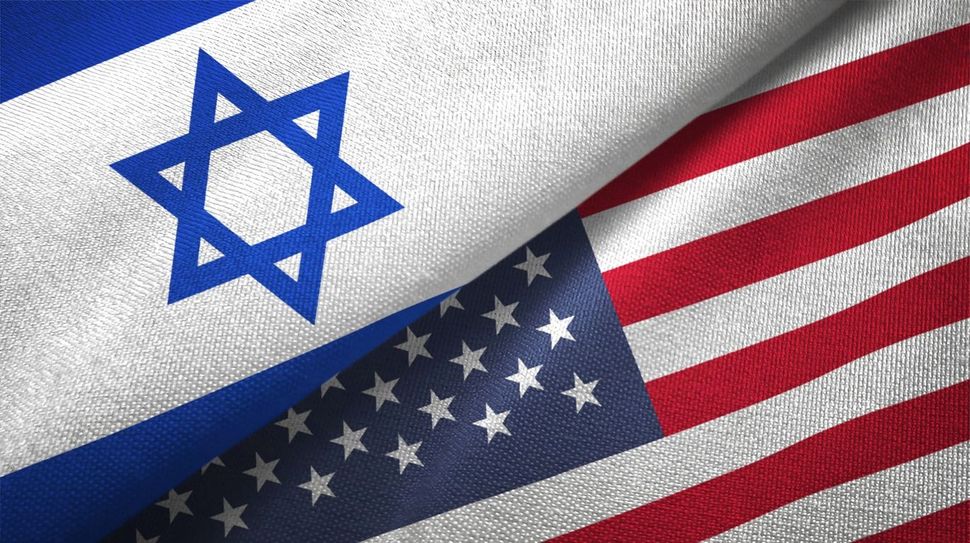My Jewish day school taught me that we are part of the American story

United States and Israeli flag together Image by iStock
In a recent opinion piece in these pages, an anonymous teacher wrote that Jewish schools are teaching students dual-loyalty to Israel. This was not my experience.
I graduated from Harkham Hillel Hebrew Academy in ‘03 and Yeshiva University Boys High school of Los Angeles or YULA in ‘07. These were Modern Orthodox Jewish day schools. We spent mornings learning Judaic studies, and afternoons learning everything else.
To be sure, both schools were proudly Zionist; at Harkham Hillel we sang Hatikvah at assemblies, and recited the Jewish festival prayer Hallel on Israeli independence day. At YULA, Israeli History was a mandatory course, and many of us went on to take gap years in Israel after graduation. We were taught as students to love Israel, and many of us still do as adults.
But love for this country was also an important part of my Jewish day school education. We traveled to Washington DC on school trips. We read “The Federalist Papers” and Mark Twain in class.
Still, it seems silly to have to run through a checklist of my school’s patriotic bonafides: Was there an American flag in every classroom? Portraits of the founding fathers in the Beit Midrash? Mandatory recitations of the pledge of allegiance before davening? Does it matter?
We, the students of American Jewish day schools, are American. Our connection and loyalty to our country is unwavering and should be accepted without question.
This is why accusations of so-called Jewish dual-loyalty are so noxious. They imply that somehow we’re not fully a part of the American story, that American Jews are guests in a benevolent host nation who must strive daily to prove their singular-loyalty.
Dual-loyalty also implies a sort of patriotic hierarchy. Those who invoke it conjure up other schools, somewhere out by the open roads of the American heartland, where every morning, svelte Christian students run military drills in cornfields as the “Battle Hymn of the Republic” is played on a continuous loop. These schools needn’t prove their loyalty to America.
But as a student in a Jewish day school, I was taught something different: I was taught that a Jewish day school in Skokie is no less American than a military prep school in Des Moines.
I was taught that a group of bar-mitzvah aged American boys wrapping tefillin or garbling the words to Hatikvah in a middle school gymnasium in Beverly Hills is as American as baseball, Monticello, or gospel music.
My American Jewish day school did not offer a course on patriotism. In this way, I imagine it was similar to most every other school in the country. And yet it was my Jewish day school education that taught me not to mistake flag waving patriotic pageantry for true lived expressions of the American idea.
My Jewish American day school was one such expression.
I attended school everyday with the grandkids of Holocaust survivors liberated by American troops, kids whose parents fled Soviet tyranny, and kids who themselves fled the tyranny of the Islamic Republic of Iran. My own grandfather was a proud Jewish Marine. We didn’t need a teacher to intellectualize “one nation under G-d” for us in a classroom.
Our patriotism, like our connection to Judaism, was a lived experience, something true and sacred that we held inside us everyday.
Zionism remains an important issue to me, and I am grateful for a Jewish day school education that left me with a deep connection to The State of Israel and its people.
Like the students of any school, we graduated, and we grew up. Some of us went to rabbinic school, some of us even moved to Israel. Most of us though went to college here, got jobs. A lot of us have started having families now in different cities across the country — our country.
We keep kosher, and we don’t. We wrap tefillin every day, and we forget to. But for most of us, our Jewish day school education left us with a profound love for Judaism. And that is as much a part of the American story as anything else.
Isaac Himmelman is a journalist and Senior Video Producer at HuffPost.
















